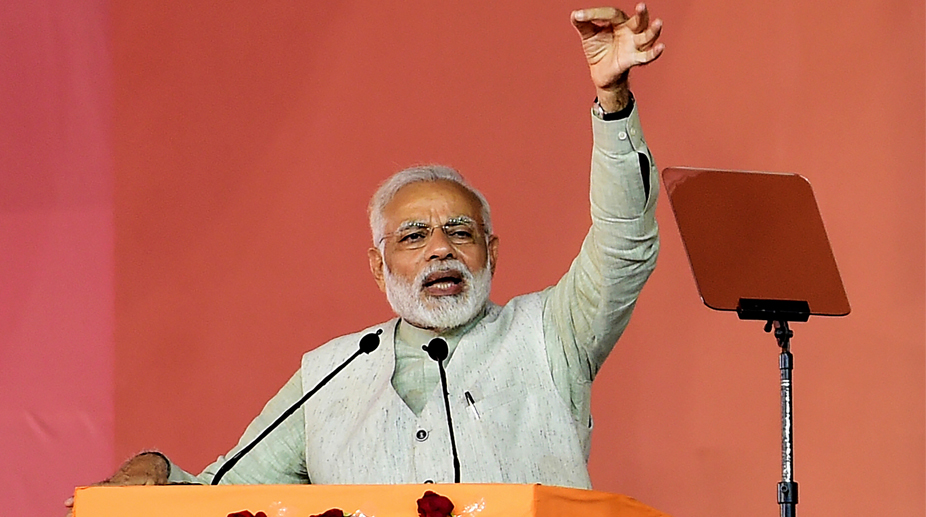As 2026 Nears, BJP Balances Governance and Ground Realities in Assam Election Push
According to party insiders, three internal surveys have already been conducted across Assam’s 126 assembly constituencies.
Prime Minister interacted with Bharatiya Janata Party MPs and MLAs through the “Narendra Modi” mobile app on Sunday
SNS | New Delhi | April 22, 2018 7:53 pm

Prime Minister Narendra Modi (Photo: Facebook)
On a day Minister of State (Independent Charge) for Labour and Employment Santosh Gangwar raked up a controversy by stating that “rapes are unfortunate, but all of them can’t be stopped”, Prime Minister Narendra Modi on Sunday asked the party’s lawmakers to not make off-the-cuff remarks as they hurt the party image.
Interacting with BJP MPs and MLAs through the NaMo App, PM Modi also said party members should not always blame the media for blowing things out of proportion since it was them who provide “masala” to the Press.
Advertisement
“We give masala to the media. The moment we see a cameraperson, we jump to make a statement as if we are great social scientists or intellectuals. Then these ill-informed statements are used by media and the party’s image takes a beating. It is not the media’s fault,” Modi said. The PM’s rebuke comes amid a series of off-the-cuff remarks made by party motormouths in recent times.
Advertisement
Appreciating the work of the BJP MPs and MLAs at the grassroots level, PM Modi said his government is focusing on education for children, opportunities for youth and medicine for the elderly.
He asked all the party MLAs to undertake at least one developmental work for villages under them which would help take the villages forward, and also invited suggestions to celebrate the 150th birth anniversary of Mahatma Gandhi with the focus on “Swachhta Abhiyan” (cleanliness drive).
“Your connect with people directly has ushered in a positive change by ensuring that schemes reach the grassroots as well as concerns of people reach the lawmakers. The BJP leaders should be involved in every work that is being undertaken in the society for the welfare of people,” the Prime Minister said during an interaction with Bharatiya Janata Party (BJP) MPs and MLAs through the “Narendra Modi” mobile app.
Answering a question on improving the lives of the people in the villages, the Prime Minister stressed on collective power of the people residing in villages.
“The development of villages is not a work of only the budget or the government… The people also need to be aware of their rights and duties. The biggest strength of any village is its unity,” he said.
He also mentioned about social activist Anna Hazare’s village, where he had stressed on cleanliness and how that village had now become a model for others to follow.
Speaking about the Mudra Yojna, he said that 11 crore people had already benefited from the scheme.
“Women in self-help groups are coming up with new employment opportunities in various sectors,” he said.
Lauding BJP workers for the “Gram Swaraj Abhiyan” being held from April 14 to May 5, the Prime Minister urged the party cadres to ensure that the benefits of Mudra Yojana, Ujjwala Yojana and insurance schemes reach the grassroots level.
He urged the party leaders to hold regular Gram Sabhas, enhance their social media outreach, encourage the use of the BHIM app and further the movement of cashless transactions.
During an hour-long interaction, the Prime Minister also shared his views on the recently launched “Ayushman Bharat” scheme.
“The government wants to establish wellness centres for villages, so that people can avail the best healthcare facilities. The government is focusing on education to children, opportunities for youth and medicine for elderly,” he said.
Speaking on agriculture, he said many farmers were unaware of a number of agricultural facts and schemes and that there was a need to organise campaigns to educate them.
“There is a need to highlight that the recommendations of the Swaminathan Commission on Minimum Support Price have been implemented, so that the farmers can benefit from it,” he said asking the lawmakers to organise workshops on the latest farming techniques in villages.
Mentioning the BJP’s recent victory in Jharkhand in the Nagar Parishad, Nagar Panchayat and municipal corporation polls, the Prime Minister said the win reflected the people’s faith in the politics of development of the BJP.
During the interaction, the Prime Minister also answered questions from elected representatives of the party across the country on various issues including skilling the youth, rural development and farmers welfare.
(With inputs from IANS)
Advertisement
According to party insiders, three internal surveys have already been conducted across Assam’s 126 assembly constituencies.
In a strong rebuttal to three-timer ex-Chief Minister Gehlot's casual remark where he described the detention of MISA detenus during the Emergency as a “routine action", CM Sharma pointed out Gehlot's "lack of realisation" of the trauma and woes faced by "Loktantra Praharis"(MISA detenus) and their families.
Earlier this month, US Secretary of Commerce Howard Lutnick expressed optimism about a potential trade pact, saying a deal could be expected “in the not-too-distant future.”
Advertisement
